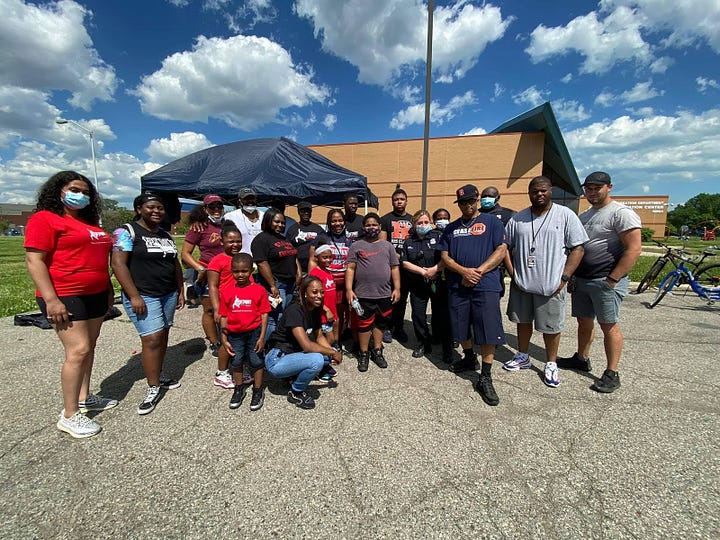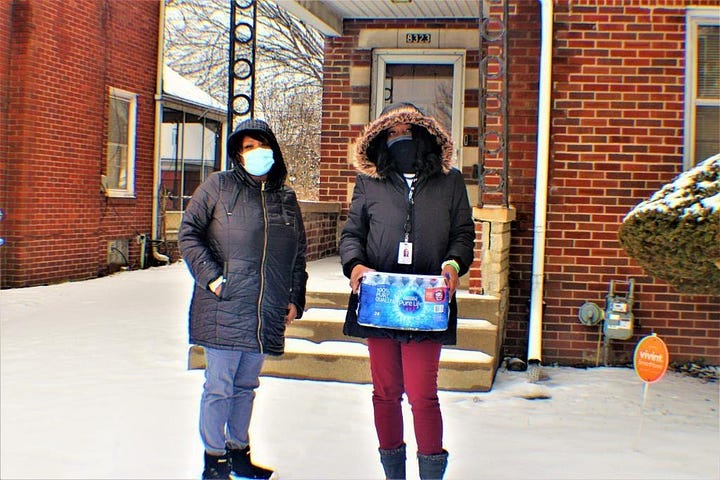Detroit, Michigan, USA
Detroit Proves Data Can Help Prevent Gang Violence — and Help Residents Get Through the Pandemic.
Project Type:
Communications, Cross-Sector, Equity, Health & Wellness, Housing, Public Safety
At a Glance
Ceasefire Detroit, a data-driven program, has helped reduce violent crime arrests by 47 percent from 2013 to 2016, as well as increased participants’ employment rates by 237 percent and safe housing obtainment by 44 percent in 2019 compared to 2018.
Ceasefire’s success and metrics showing the need for greater capacity have grabbed key local and federal funding partners’ attention as well as been included in successful applications for funding from philanthropic organizations.
Community Health Corps leverages data to tackle poverty through an intense, restorative case management model.
Building a Strong Foundation with Data
Like nearly all major U.S. cities, Detroit saw an uptick in violent crime during the pandemic likely due to a combination of social unrest, mental health challenges, and economic uncertainty. But the leading cause of this surge was not gangs — a problem that once made Detroit the nation’s murder capital.
The Motor City was able to bring gang violence down in recent years through a focused deterrence approach known as Ceasefire Detroit. It brings together policymakers, local, state, and federal law enforcement partners, faith-based leaders, and nonprofit groups to help at-risk residents put down guns and avoid gang-related activities in favor of stable employment and housing. Through data-driven direct outreach, community events, and referrals from partner organizations, Ceasefire identifies and engages individuals likely to be shooters or victims of shootings. With targeted social services and community support, the initiative then helps people become what Detroit Police First Assistant Chief Todd Bettison calls “violence interrupters.”

Encouraged by an evidence-based program in Boston that demonstrated the Ceasefire model’s effectiveness, Detroit launched its program in 2013 and significantly revamped it two years later. Since 2015, the City has analyzed data and tweaked deterrence approaches while growing the initiative — and gang-related violence has steadily decreased. The program is a prime example of how Detroit’s data culture is translating into on-the-ground results for residents. In recent years the City has built a strong foundation of data practices, focusing on data governance, open data, evaluations, and performance & analytics.
In partnership with Michigan State University (MSU), the City has regularly evaluated Ceasefire’s performance to understand what is working and how to improve the program. In 2019, the MSU School of Criminal Justice compared Ceasefire participants to a control group of similarly at-risk city residents not connected to the program. It found there was a 47 percent reduction in violent crime arrests and a 29 percent reduction in arrests overall for program participants from 2013 to 2016.
This evaluation and others like it have helped the City refine, grow, and adapt Ceasefire to the current needs of the community. By linking data detailing violence reductions to specific Ceasefire deterrence and support efforts, the City has been able to strategically address programmatic gaps and increase the initiative’s overall efficacy. Data has been a key tool wielded by the Detroit Police Department and other city staff to improve Ceasefire’s impact. For example, a legal services liaison was hired after data in the 2019 evaluation revealed unmet members’ needs. And the progress of Ceasefire participants — toward goals related to education, housing, employment, and other areas — is now assessed weekly and reviewed biweekly with program partners. Two results: Participants attaining employment increased 237 percent and participants attaining safe housing increased 44 percent in 2019 compared to 2018.
Another benefit of Ceasefire’s commitment to data-driven governance: Key funding partners, which include Detroit’s City Council and the U.S. Department of Justice, can see Ceasefire is working. And metrics showing the need for greater capacity have been included in successful applications for funding from philanthropic organizations.
“Ceasefire has become Detroit’s flagship violence reduction program because the data-driven approach works — and we can show it works by pointing to specific results. This kind of performance management takes time and attention, but it’s 100 percent worth it. Across the City, this is increasingly what the government looks like.”
“We’re able to connect directly to at-risk individuals to help them put down the guns. We connect them with jobs and other resources they may need.”
Strengthening the Safety Net
Another example of how Detroit’s consistent investments in data-driven and evidence-based strategies are improving the lives of residents is the Community Health Corps (CHC). The basic idea of this first-of-its-kind program — launched in 2020 following a community needs assessment conducted by Detroit’s health department — is to tackle poverty through an intense, restorative case management model. CHC staff connect vulnerable residents to the right services provided by government and nonprofits — everything from food to rental assistance to behavioral health services. Demand for help spiked in 2020 as pandemic-related job losses rose sharply.
Whereas Ceasefire leans on data to analyze program results and then course-corrects, CHC leverages data to identify people in need. The initial method was by finding residents who had fallen behind on city utility bill payments. “Data was a crucial starting point for this whole effort,” says Sheilah Clay, CHC’s executive director. “I think that speaks to how established and valuable Detroit’s data culture is.”
Launched by the City in fall 2019 with an initial $1.4 million from the federal CARES Act, CHC offers individuals a team of a case worker and community health workers, whose job it is to ensure they get the help they need. Too often, people in need are given referrals to services but give up when they hit a snag — like lacking information to complete a required form or missing an appointment due to lack of child care.
“We’re going to be right there in the trenches with you until you no longer need our hand,” says Clay. She expects this to take 9–12 months on average; that kind of intensive case management in a city-backed program is groundbreaking.
When they started calling to offer help, many people were surprised and skeptical, Clay says. “We showed up at doorsteps with food boxes and cases of water to show we are serious. People were crying.”

With 200 cases being actively managed and more than triple that number of people on a waitlist, CHC is currently at capacity. Case workers have helped residents fix cars so they can get to work, replace a boiler so they can heat their home, repair leaky pipes to reduce water bills, and connected people to job training and employment opportunities. CHC has partnered with the University of Michigan’s Poverty Solutions to evaluate the impact of the funds it distributed in 2020, and continues to track program data to understand the program’s value and guide expansion. It has also surveyed the initial cohort of clients and plans to survey staff.
Data-driven analysis will be essential for proving CHC’s impact, and will hopefully help sustain the program beyond CARES Act funding. Nearly $1 million in donations has already been raised, and the City will also push for ongoing state and federal funding. (Initially launched by the City of Detroit, CHC is now an affiliated nonprofit.)
“One of our goals is to be a best-practice model that can be replicated in other cities. We keep up on a lot of data because without it, we can’t show how we’ve helped improve lives.”